A Guide to Backyard Bug Management
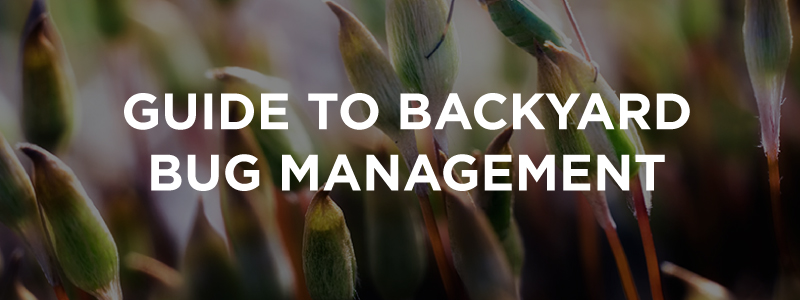
Long days, late nights and warm weather mean more time spent outdoors. You’ve spent the spring sprucing up your backyard and getting it ready for family gatherings and entertaining. You’re ready to fire up the grill and enjoy dining al fresco all from the comfort of your backyard.
Like clockwork, bugs of all varieties show up unannounced. Their presence is more than just a nuisance. It can force you, your family and guests to retreat indoors to avoid being bitten, stung or having your food infiltrated.
Backyard bugs are a reality of warm weather. But they don’t have to be your fate. There are plenty of proactive solutions to get rid of bugs in your backyard. But the key is knowing the difference between good and bad bugs. This helps ensure you’re not unknowingly ridding your yard of friendly helpers. Part of pest control is understanding the biodiversity of your backyard and how beneficial bugs contribute to your enjoyment of your outdoor lifestyle.
Backyard bug management is possible. You just need a little guidance and the right solutions. Read on to learn about the kinds of bugs you can find in your backyard, which ones are good and which ones need to go. More importantly, we’ll offer you some helpful pest control options for your Indiana home, including our very own Northwest Indiana mosquito control solutions.
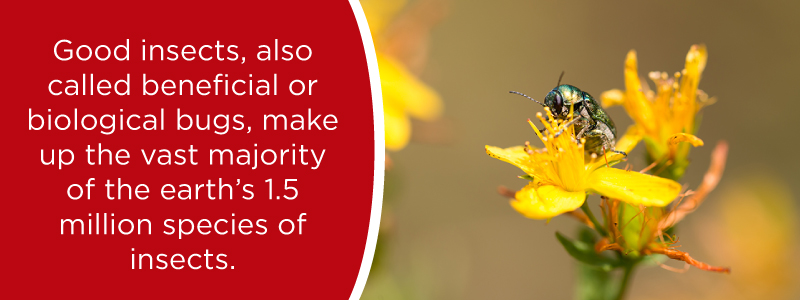
Bugs You Can Find In Your Backyard
Your backyard is home to a myriad of living beings. While some creatures do their best to hide, others make their presence known in the form of stings and bites. There are two broad categories of bugs and insects you’ll find in your backyard: the good and the bad. Good insects, also called beneficial or biological bugs, make up the vast majority of the earth’s 1.5 million species of insects. Less than 3% these insects are bad.
Bad insects are harmful for several reasons. Many homeowners aren’t even aware of the extent of problems that these bad bugs can cause. It’s important to know how to spot these pests and use appropriate measures for eliminating them.
The other side of this coin is knowing which types of bugs are beneficial. These are the bugs you want to welcome to your backyard. Creating a hospitable and protective environment for good bugs equates to a less inviting environment for bad bugs.
Here are a few good reasons to control and eliminate bad bugs in your backyard:
- Pests are a nuisance: There’s nothing more annoying than wasps and mosquitoes hovering around you and your guests while you’re trying to enjoy your freshly grilled burgers. Certain bugs are also attracted to sweet scents and can end up in your food and drinks.
- Some bugs are harmful to humans: Stinging insects like wasps and hornets can be more than just annoying; they can harm you. Some people, including children, experience severe allergic reactions from stings. Likewise, mosquitoes can cause painful bites, skin inflammation and rashes. But they can also carry dangerous viruses that can cause infections and respiratory problems. Ticks are another growing problem as they can infect humans with Lyme disease, an incurable condition.
- Insects can damage your plants: Certain pests can damage plant growth. Depending on the pest, your trees, shrubs, lawn, flowers and fruit and vegetable plants may become damaged enough that they’ll die off. This is especially concerning when pests attack new growth after recent plantings.
- Bugs spread plant diseases: Some bugs are known to spread diseases between plants that can effectively kill off your crops. Certain bugs excrete harmful bacteria through their feces and urine. When these bacteria come into contact with plants, it can quickly kill them off.
- Pests attract other pests: Certain prominent pests leave a trail of sweet substances as they explore your backyard. These substances attract other pests, which can further put your garden at risk of disease.
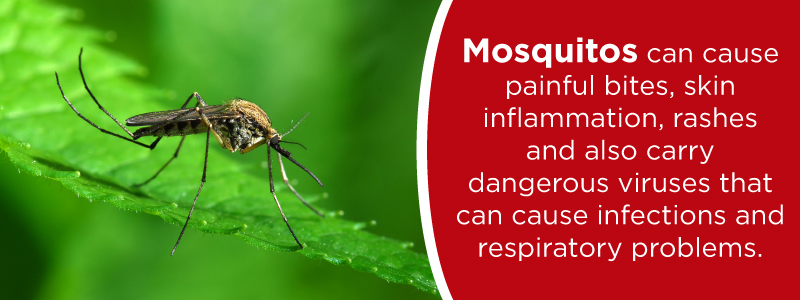
Effective pest control requires you to look at the entire role that bugs play in your backyard ecosystem. Distinguishing between good and bad bugs is critical. We know that bad bugs can wreak havoc on our plants and pose a threat to human health, but what benefits can good bugs offer? Here are several reasons to attract and keep good bugs:
- Predatory bugs feast on bad ones: Predatory insects are critical to keeping the bad bug population at bay. Larger insects and spiders sustain themselves on bad bugs, which means they’re helping to protect your garden from pests.
- Good bugs stop the bad bug life cycle: One of the primary problems with a pest infestation is their fast life cycle. If you can’t stop a pest’s life cycle by preventing eggs from hatching, then you can quickly see a burst of bugs. Beneficial bugs of all varieties continuously feed on pests. Certain ones feed on bad bugs during certain stages of their life cycle. This helps cut back the population of invasive backyard pests.
- Pollinators help grow new plants: Beneficial bugs are essential for plant health and development. That’s because certain good bugs transfer pollen from plant to plant, which fertilizes the females so they can grow more plants. This is how flowering gardens thrive.
- Beneficial bugs help plants thrive: Certain bugs that live in the soil create tunnels and galleries within the soil. This helps aerate the soil, which is an essential element in plant growth. Soil-dwelling bugs also break down organic matter in the soil, which goes on to serve as plant nutrients.
To create an enjoyable and healthy backyard environment, you need to be aware of the bugs you’re hosting. Pest management is a balancing act between controlling the bad bugs while bolstering a diverse presence of beneficial ones. But to make that happen, you need to distinguish between the good and bad bugs that may show up in your Indiana property.
Types of Good Bugs In Your Backyard
Now that you know all the benefits that good bugs have to offer, you’ll need to know who these bugs are and what roles they play in pest control. Here are some common good backyard bugs to have around:
- Ladybugs: If you see a ladybug in your garden, rejoice! Ladybugs are great predatory bugs. They feast on harmful aphids and mites that will otherwise gorge on your herbs and flowers. Ladybugs also help destroy pest life cycles by eating both mature insects and their eggs. Everyone can recognize an adult ladybug, but the young ones are perhaps less known. Baby ladybugs are black with orange and yellow spots, so be sure to keep these alive.
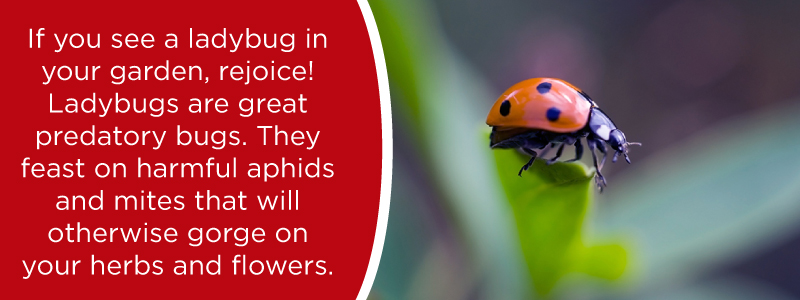
- Spiders: Spiders are natural predators and eat several kinds of bad bugs. Though some spiders can be poisonous, most are handy creatures to have in your backyard. While they may also eat other beneficial bugs, they can devour a variety of harmful pests.
- Honey bees: The presence of honey bees in your backyard is a good sign. The global honeybee population has been famously declining over the past several years. Do what you can to protect your honey bee population. These pollinators buzz from flower to flower fertilizing plants and promoting plant growth.
- Butterflies: Like honey bees, butterflies are also important pollinators that flutter between flowering plants. You can easily attract more butterflies to your backyard by planting nectar-rich flowering plants like violets, lilies and dragon flowers.
- Earthworms: Earthworms help give plants the elements they need to thrive. Earthworms live in the soil and feed on organic matter. Their castings, or excrement, offer important plant nutrients. Through their roots, plants take up the nutrients from earthworm castings, which helps them grow strong and healthy.
- Dragonflies: Dragonflies are a welcomed predatory backyard bug. They eat mosquitoes and mosquito larvae as well as other small insects. While they do eat other beneficial bugs, having a few dragonflies in your backyard can help keep the balance. Additionally, dragonflies are completely harmless to humans, and they add beauty to your backyard landscape.
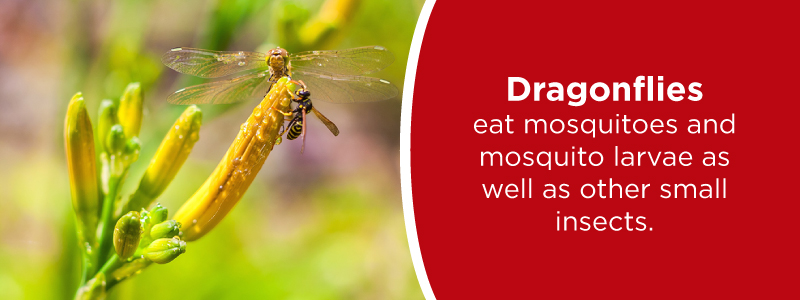
- Lacewings: Lacewings don’t harm plants because they feed on nectar. Additionally, when lacewing eggs hatch, the larvae feed voraciously on tiny pests and their eggs. You can recognize adult lacewings by their fine green and brown wings.
- Praying mantises: As natural predators, praying mantises are vital to natural pest control. Praying mantises eat larvae specifically. This is important because larvae eat plant leaves to promote their own growth. When it comes to stopping pests life cycles, praying mantises are a must-have inhabitant of your backyard.
- Hover flies: Hover flies are small, fast-moving flies that can easily be mistaken for tiny bees. They’re yellow and black striped flies that pollinate flowers. Their larvae are pale green or brown and can eat hundreds of pests.
Type of Bad Bugs In Your Backyard
While there are fewer bad bugs than good ones, the bad bugs are good at making their presence known. Left unchecked, pest populations can quickly amass and destroy your backyard crops. They can also prevent you from enjoying your backyard lifestyle. Here are a few of the bad bugs to control during the warmer months:
- Aphids: Aphids are small pests that cluster together on new plant growth. You can often find groups of aphids on the undersides of new leaves. Aphids can attack ornamental plants as well as vegetables and herbs. They also leave behind a honeydew substance, which attracts further pests that breed in your backyard.
- Caterpillars: Caterpillars are the larvae of butterflies and moths. During their growth-stage, larvae consume massive amounts of plant matter at an alarming rate. Caterpillars can severely damage new growth, often chewing the stems off right at the base.
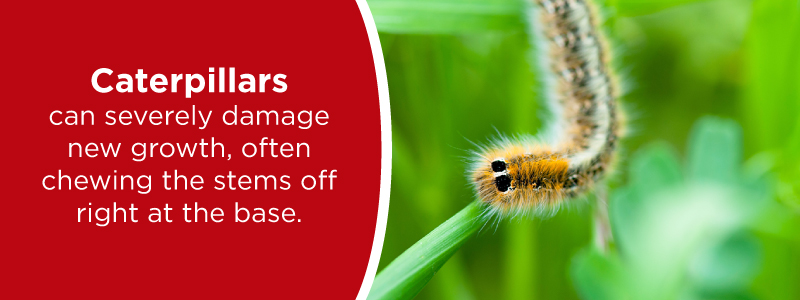
- Japanese beetles: Japanese beetles are an invasive pest that can destroy backyard gardens. Japanese beetles eat plant leaves and continue eating them until there is no foliage left. Japanese beetle populations have been expanding throughout North America. Implementing proper pest control methods can stop Japanese beetles from reproducing.
- Cucumber beetles: Cucumber beetles are small yellow and black striped or spotted beetles. They feed on young plants, preventing your garden from thriving. Cucumber beetles can also easily transmit diseases from one young plant to another.
- Mosquitoes: Though they aren’t much of a threat to plants, they are certainly unwelcome guests. Mosquitoes lay their eggs in standing pools of water such as ponds and fountains. If you’ve noticed an uptick in your mosquito population during summer months, then you’re definitely in need of mosquito control solutions.
- Snails and slugs: Slugs and snails are likely the most prevalent pests you’ll find in backyard gardens. They thrive in moist, rich soil conditions. Slugs and snails eat decaying organic matter as well as living plants. It’s important to keep your gardens clean of debris to deter snail and slug populations.
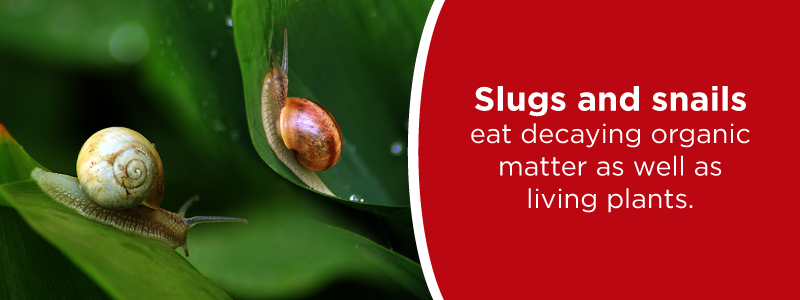
- Spider mites: Tiny spider mites don’t let their size hold them back from destroying your backyard vegetation. A clear sign of spider mite activity is small yellow patches forming on your plants’ leaves. You’ll often see several of these red colored mites grouped on their delicate webs.
- Hornets and wasps: Hornets and wasps can be seen both as beneficial and as pests. Wasps and hornets do feed on small pests like aphids and mites. However, there are far friendlier and less annoying beneficial bugs to keep around. Wasps and hornets can cause severe pain and even allergic reactions when they sting or bite. This is especially concerning if you have pets and children. It’s best to take measures to minimize the wasp and hornet population in your backyard.
- Ticks: There are hundreds of species of ticks, many of which could be hiding in your backyard. If you live near a forested area, you may be at risk of harboring deer ticks and other types of disease-carrying ticks. Tick populations are on the rise, which means so is the risk of tick infections like Lyme disease.
It’s important to know how to prevent pests and stop them from reproducing. By knowing which pests you have, you can apply the appropriate pest control methods.
How To Naturally Eliminate Bugs In Your Yard
When it comes to getting rid of bugs in a backyard, homeowners often look for natural remedies to get the job done. If you’re looking to remove pests naturally, try using:
- Soapy water: Spray plants with a mixture of dish soap and water to dehydrate aphids and spider mites.
- Garlic: Add a clove of garlic into the soil of your plants to repel bugs.
- Herbal water: Mix essential oils like thyme, basil, mint, rue, rosemary or lavender into some water and spray the mixture onto your plants to keep bugs away.
- Nicotine tea: Soak crushed tobacco leaves in warm water and dish soap and strain for 30 minutes. Then, spray the mixture onto the leaves of your plants.
How To Get Rid of Bugs In Your Yard With Pest Management Solutions
Pest control is a combination of prevention and elimination. You need to eliminate the current bugs in your yard and prevent them from reproducing. You can take matters into your hands with different DIY pest control habits and methods. There are also professional bug service landscaping companies that specialize in pest control in Indiana.
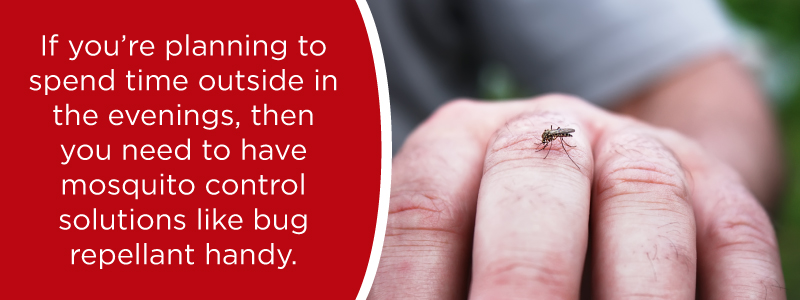
Here are some of the best ways to control and eliminate bugs in your backyard:
- Use mosquito repellent: If you’re planning to spend time outside in the evenings, then you need to have mosquito control solutions like bug repellent handy. Spray yourself down around dusk, which is when mosquitoes become active. Wear long sleeves and long pants to avoid having your skin exposed. Be sure to cover your feet as well. Don’t forget to spray your hands and ankles, which are common mosquito targets.
- Use citronella candles: Mosquito repellent should be your last line of defense. Ideally, you want to stop mosquitoes from coming into your patio or deck area, to begin with. Form a perimeter of lit citronella candles around your outdoor dining area. This helps to ward off mosquitoes and keep them away from you and your guests.
- Don’t leave out the garbage: Garbage and food waste always attracts pests, rodents and other unwanted creatures. Outdoor garbage bins should be kept far away from your dining area. Be sure to seal all trash and compost bins properly.
- Keep food sealed: Open food containers attract ants, flies, wasps and other pests. While serving dinner outdoors, be sure to have lids and covers handy to keep food sealed. Sugary drinks also attract bugs, so be sure to cover your drinks in between sips.
- Install Patio Fans: Mosquitos and other flying insets often can’t put up a fight with the breeze that comes from fans. Install fans around your patio to keep bugs away and also stay cool in the warmer months.

- Eliminate standing pools of water: Water sources like ponds, fountains, bird baths and pools are the perfect breeding ground for mosquitoes. Stay on top of your yard maintenance during the warmer months by eliminating or covering water sources and keeping them clean. Also, be sure to clean out the filters, which can also harbor mosquito eggs.
- Remove yard debris: Plant debris, piles of leaves, grass clippings and overgrowth all attract pests. Mosquitoes, slugs, snails and rodents all take shelter in these damp, clumpy areas. Experts advise that during warmer months you should conduct yard maintenance on a weekly basis. Maintenance tasks should include cutting the lawn, trimming tree limbs and pruning back shrubs. Also be sure to remove dead flowers heads and leaves from garden beds.
- Inspect for infestations: Be aware of the places where pest infestations can start. These include firewood piles, compost bins, sheds and greenhouses as well as cracked walls and roofs. Seal up any holes in your home’s foundation and siding, and replace any loose or curling shingles.
- Use professional pest control services: If you do find your home and yard overrun with pests, then waste no time in calling in the professionals. Northwest Indiana pest control companies like Ricci’s Landscape Management use treatments that eliminate a variety of backyard pests including mosquitoes.
Many people turn to pesticide products that they can apply themselves. But this can be harmful to plants, pets and children if misapplied. Always use products that are safe for pets and kids to make sure your backyard remains a healthy environment for the whole family.
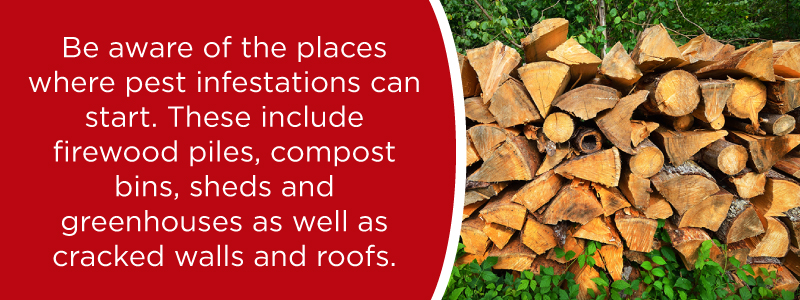
Choose Ricci’s Landscape Management – The Best Way to Get Rid Of Bugs In Any Backyard
Backyard pests can ruin summer evenings, get-togethers and family time spent outdoors. But you don’t have to suffer from the nuisance and health risks of backyard bugs. Even if you’ve tried your best to seal food containers and garbage bins, clear your yard of debris and standing water and apply mosquito repellent, many DIY bug management solutions aren’t enough to stave off pest infestations.
That’s where professional bug management services in Northwest Indiana come in. Professional landscape services like Ricci’s Landscape Management have the experience and the expertise to eliminate bad bugs in the yard while protecting good bugs so you can get back to enjoying your backyard.
Ricci’s Landscape Management offers mosquito and pest control perimeter spraying services. We use a special pest control treatment that eliminates 90% of mosquitoes, ticks and other annoying or dangerous pests. We strategically apply a blanket of our pest control solution to areas throughout your yard, including:
- Along garden beds
- Across the lawn
- Around your home’s exterior perimeter including your windows, doorways, decks and eaves
- Along your home’s foundation
- Around garden sheds and greenhouses
Certified technicians apply Ricci’s Landscape Management mosquito and pest control solutions. Pest protection lasts up to 21 days, meaning you can apply it during the height of mosquito-season. For best results, apply our pest treatment formula from April to October to prevent pests from laying their eggs and reproducing. We also offer an unlimited spray package. This includes a pest control application every three weeks to ensure your bug barrier stays intact all summer long.
We know how important beneficial bugs like bees and butterflies are to your backyard ecosystem. That’s why our certified technicians carefully apply the pest control treatment so that it doesn’t affect flowering plants. Rest assured that Ricci’s Landscape Management pest control products are safe for pets and children. Our technicians also ensure that they don’t apply the products around ponds and water features to avoid harming frogs and fish.
If you’ve got a backyard event coming up, Ricci’s Landscape Management can control and eliminate pests to ensure your guests enjoy their time. We can apply our treatment up to four days before your event so that it goes off without a hitch.
Learn more about Ricci’s Landscape Management mosquito and pest control service and request a quote today. Or, connect with us on Facebook or Pinterest!






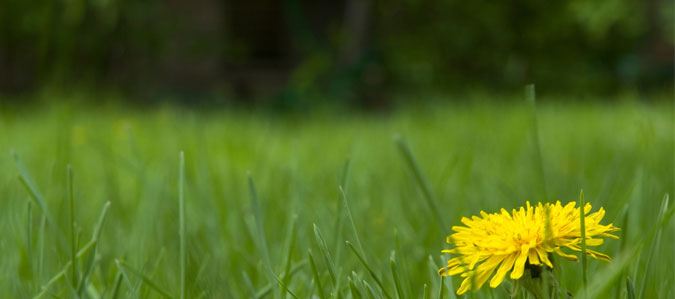


One Response
It was interesting to read that bugs such as wasps and hornets can actually cause harm to humans. My family is moving into a new home that has a large backyard, which could house a lot of these insects. We will need to come up with a solution to protect our yard from these pests.